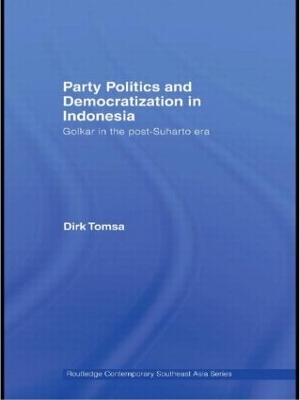
Party Politics and Democratization in Indonesia
Routledge (Verlag)
978-0-415-46008-8 (ISBN)
Party Politics and Democratization in Indonesia: Golkar in the Post-Suharto Era provides the first in-depth analysis of contemporary Indonesian party politics and the first systematic explanation why Golkar is still the strongest party in Indonesia.
Applying a multi-dimensional conceptual framework of party institutionalization theory, the book examines Golkar’s organizational infrastructure, its decisional autonomy and programmatic platform as well as the party’s relations to the mass media. Strengths and weaknesses in the individual dimensions of institutionalization are then contrasted with the corresponding levels of institutionalization reached by Indonesia’s other major parties. Tomsa argues that Golkar remains Indonesia’s strongest party because it is better institutionalized than its electoral competitors. However, while highlighting the former regime party’s strengths in key aspects of party institutionalization, he also shows that Golkar also has some considerable institutional weaknesses which in 2004 prevented the party from achieving an even better result in the general election
As an empirical study on Golkar, and Indonesia's other major political parties, this book will be of huge interest to students and scholars of Southeast Asian politics, political parties and elections and democratization.
Dirk Tomsa is an Associate lecturer at the University of Tasmania, Australia. He holds a joint appointment in the School of Asian Languages and Studies and the School of Government.
1. Introduction: The Remarkable Resilience of Golkar 2. Theoretical Reflections: Protracted Transitions, Uneven Party Institutionalization and the Special Role of Former Hegemonic Parties 3. Systemness: Deconstructing the Myth of Golkar’s Party Machinery 4. Decisional Autonomy: The Main Problems Lurk Inside the Party 5. Value Infusion: In Search of Golkar’s Roots 6. Party Reification: Mastering the Use of Symbols and the Pitfalls of Political Communication 7. Gauging Uneven Party Institutionalization: How Strong are the Others? 8. Conclusion and Outlook: Uneven Party Institutionalization and the Future of Democracy in Indonesia
| Erscheint lt. Verlag | 17.7.2008 |
|---|---|
| Reihe/Serie | Routledge Contemporary Southeast Asia Series |
| Zusatzinfo | 13 Tables, black and white; 12 Line drawings, black and white; 12 Illustrations, black and white |
| Verlagsort | London |
| Sprache | englisch |
| Maße | 156 x 234 mm |
| Gewicht | 690 g |
| Themenwelt | Naturwissenschaften ► Geowissenschaften ► Geografie / Kartografie |
| Sozialwissenschaften ► Politik / Verwaltung | |
| Sozialwissenschaften ► Soziologie ► Spezielle Soziologien | |
| ISBN-10 | 0-415-46008-5 / 0415460085 |
| ISBN-13 | 978-0-415-46008-8 / 9780415460088 |
| Zustand | Neuware |
| Informationen gemäß Produktsicherheitsverordnung (GPSR) | |
| Haben Sie eine Frage zum Produkt? |
aus dem Bereich


